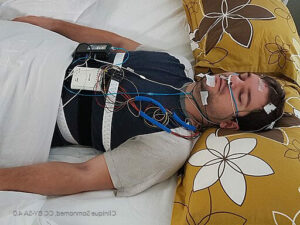This project will investigate sleep disturbance in ME/CFS and Long COVID through a retrospective evaluation of PSG data and a prospective sleep study.
Problems with sleep in ME/CFS is essential to understand and effectively treat or prevent crashes. Previous studies, using technologies available at the time, have failed to identify any specific sleep abnormalities in ME/CFS. Over the past decade, improved technologies and understanding of sleep physiology has become available. Furthermore, more specific treatments and approaches have become available for usage in sleep disorders. We propose to use these current state-of-the-art technologies and understandings to reevaluate sleep studies that have been conducted in the past two years and performed at the MGH Neurology Sleep Medicine Laboratory in well characterized patients with ME/CFS.
Furthermore, in previously collected brain fluid samples, we will develop techniques to measure orexin, which is an important protein that control sleep boundary states.
Lastly, we will conduct a prospective study in ME/CFS and Long COVID with our sleep colleagues at the Beth Israel Deaconess Medical Center Clinical Research Center using the most advanced technologies available to better identify and understand any possible abnormalities in high frequency signals in the deep brain function, in addition to immune function and other components of sleep disturbance.

What are the advantages of giving from your Donor Advised Fund (DAF)?
How do I make a donation through my DAF?
Just click on the DAF widget below. It is simple and convenient to find your fund among the over 900 funds in our system.
Still can’t find your fund?
Gifting of Stock
Broker: Schwab
DTC #: 0164
Account #: 47083887
Account Registered as:
Open Medicine Foundation
29302 Laro Drive
Agoura Hills, CA 91301
Please speak to your personal tax advisor and then email or call OMF at 650-242-8669 to notify us of your donation or with any questions.